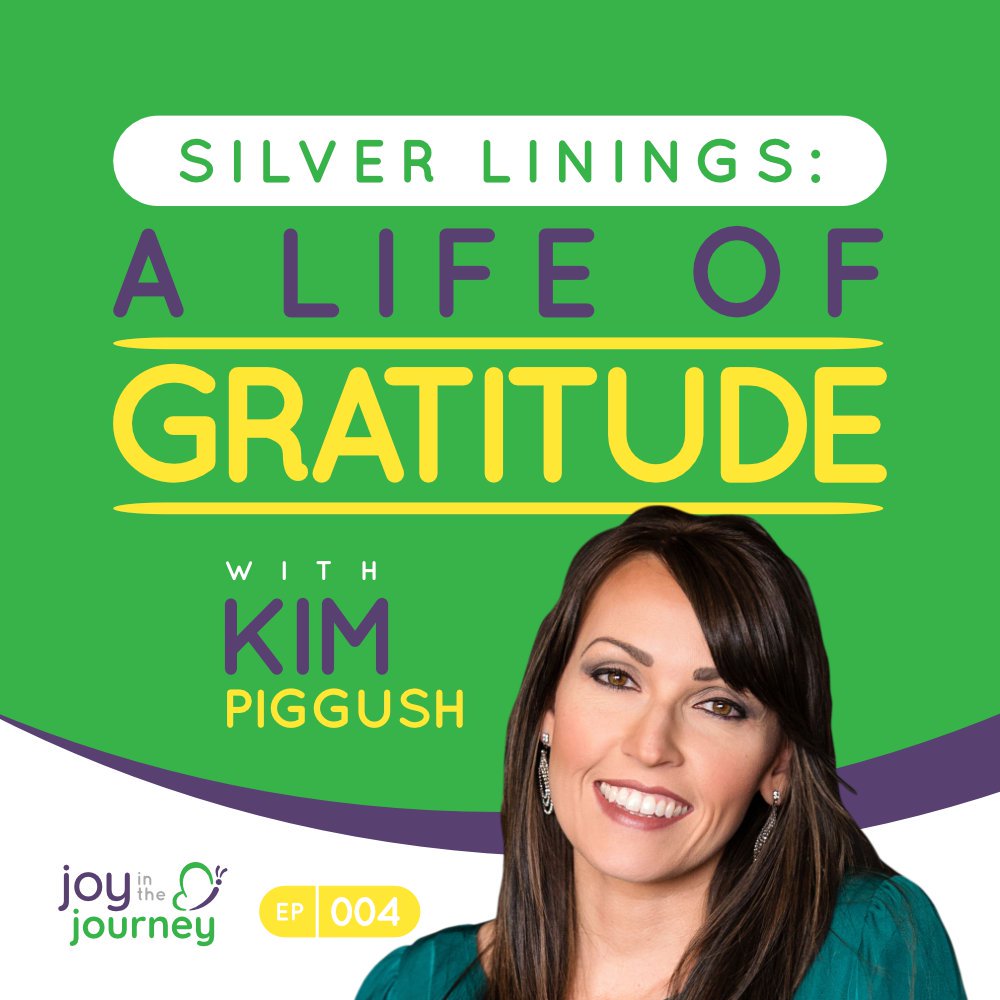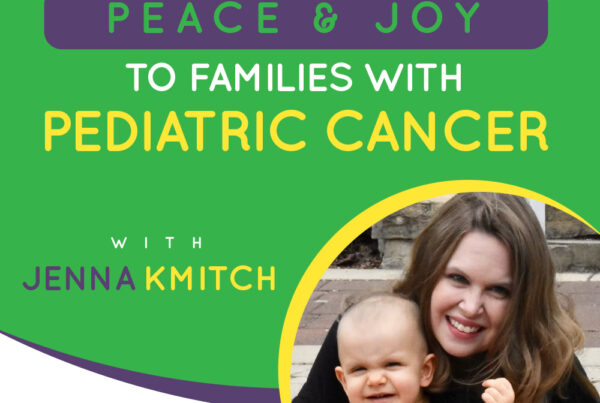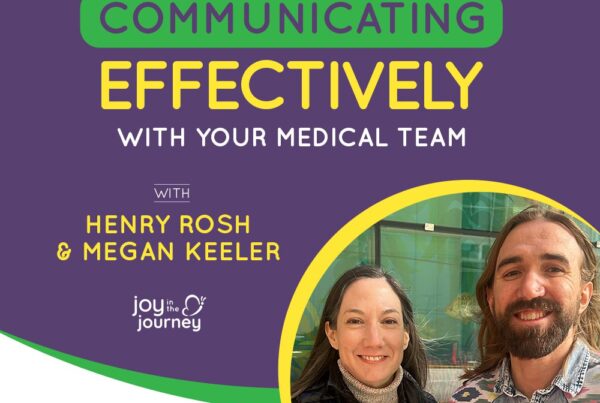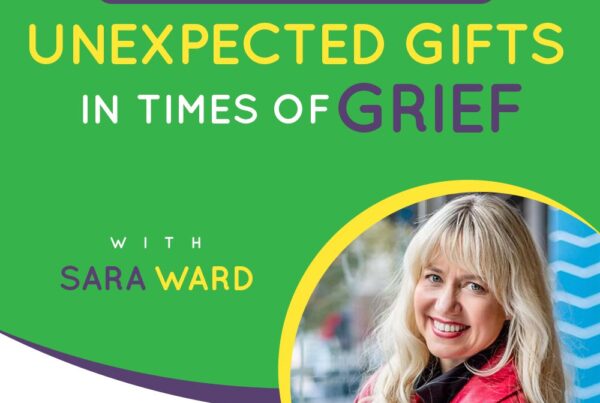It’s hard to allow other people in on your journey through life, especially for the difficult moments.
No one knows this better than today’s guest, Kim Piggush.
She’s on a mission to spread cancer awareness through public speaking as well as mentoring others through their battles with the disease.
Kim is a wife, mother of two beautiful girls, and a 2-time cancer survivor. She’s currently the Chief Operating Officer at S.A. Piggush Financial Consultants and has a previous background at K.M.P. Coaching & Consulting, her own coaching company, which set her out to climb the corporate ladder.
During her first pregnancy she was told she suffered from pancreatitis, which was actually a 10-year misdiagnosis of colon cancer, forcing her to figure out the intricacies of fighting insurance companies, putting her career on hold, and how to be a good mom while being sick.
In this episode, Kim shares the positives around the isolating moments that are darkest in your life, and how to be grateful for the empathy and generosity that you learn through your hardships and through your kids.
Key Takeaways with Kim Piggush
- How do you navigate being a mom while also having cancer?
- How can your struggles turn you into a warrior?
- Learn the grace of people coming into your life, and the lessons people teach you when you let them in.
- How to see people in a different perspective to foster empathy.
- Prepare yourself to fight insurance companies and figure out how to deal with the legalities that come with a cancer diagnosis.
- Allow yourself to get help from other people who are going through similar struggles.
- Redefine the experience and realize many people are going through it with you.
- The isolation of our darkest moments.
- Dealing with the infamous ‘it could be worse’.
- How to tackle the ‘why me?’ question.
Kim Piggush Tweetables
- “Everytime we turned around there was someone there to help, even if we didn’t want it⎯they were going through it too.” – Kim Piggush
- “Hopefully helping someone else can make it so they don’t have to start at the beginning, and I want other people to welcome my own experience in, and maybe my struggle can be for good.” – Kim Piggush
- “I truly believe that service invites joy. It gives us purpose.” – Jamie Freedlund
- “The joy and distraction that she brought was just priceless. I didn’t realize how much she was going to be the joy and the inspiration in our journey.” – Kim Piggush
Resources
Rate & Review
If you enjoyed today’s episode of The Joy In The Journey, hit the subscribe button on Apple Podcasts, Spotify , Stitcher, Castbox, Google Podcasts, iHeart Radio, or wherever you listen, so future episodes are automatically downloaded directly to your device.
You can also help by providing an honest rating & review over on Apple Podcasts. Reviews go a long way in helping us build awareness so that we can impact even more people. THANK YOU!
Transcript
[INTRODUCTION]Jamie Freedlund: Welcome to the podcast, Kim. We’re glad to have you today.
Kim Piggush: Thanks for having me.
Jamie Freedlund: Yeah. I’m so glad. Today, we’re talking to Kim Piggush, and I want to give you a little bit of information about Kim. She’s currently working as the COO of SA Piggush Financial Consulting. However, prior to her current role, Kim ran her own coaching business, KMP Coaching and Consulting, and Kim’s from Kankakee, Illinois, born and raised, married to Scott. And together they live with her two daughters, Sophia and Faith, in Bourbonnais. Kim is a young two-time cancer survivor who spends a lot of her time bringing awareness to disease that she will talk a little bit with us today about and through public speaking engagements and mentoring others through their journey. And we’re inviting through this podcast listeners to come along as we discuss finding joy in the journey. So, thank you for sharing your story with us today, Kim, with the intention of helping others to learn and be inspired to choose a little bit more joy in their journey.
Kim Piggush: Absolutely.
[INTERVIEW]Jamie Freedlund: So, I understand that your life’s journey, like many of our listeners, has not always gone as planned. Would you be willing to share a little bit about that with us?
Kim Piggush: Yes, absolutely. So, mine started a long time ago. I first noticed something when I was just a sophomore in college. I had really, really bad pains in my stomach that sent me to the E.R. There, they didn’t know what was going on. They thought I had appendicitis. It would end in surgery and they’re like, “Nope, not that but just go home and get better.” Well, I went home and got worse, went back into the hospital, was in the hospital for about three weeks. They couldn’t figure out what was wrong with me, and they diagnosed me with pancreatitis, which is really considered kind of an old man’s disease and an alcoholics disease. So, it really didn’t fit but my body kind of healed. The pain went away. And so, I went with this wrong diagnosis for 10 years. I kept having episode after episode after episode for 10 years, and I just kind of would handle it at home and then it would pass. And then when I got pregnant with my first daughter, I had a really, really bad episode that I was in bed, couldn’t move for three days. I was on vacation and couldn’t leave the bedroom, and I was really worried about whenever this was happening to me what it might be doing to my baby. And that really is what gets you nervous. You know, it’s one thing if it’s happening to you. It’s another if it’s happening to your baby.
Jamie Freedlund: How true.
Kim Piggush: So, I went back to the doctor and was like, “Okay. This is just not right.” And he said, “There’s no research that says there’s anything bad about pancreatitis and a baby.” He said, “So, once you have a baby, we’ll do more testing.” Well, once I had the baby, as most moms know, everything kind of changes and your body changes. And so, I was kind of going through all that stuff while at the same time I was noticing blood in my stool. I’m sorry. I know it’s kind of TMI, but it’s life, right? And I remember when my husband and I went on our first date post-baby and I told him which I usually tell him everything, I can’t believe I hadn’t yet, but he was like, “That’s not right. It’s not right. We’re going to the doctor.” My doctor said, “Okay. Let’s go up north. Let’s send you up north for some testing.” Did some tests. Don’t know what it was but the guy came out and he said, “I don’t know what you have but it is not pancreatitis. You need to go home right now and have a colonoscopy done.” I was 28 years old. I went home and had colonoscopy done.
That was on Friday and Monday had a colonoscopy done and we found out Monday that I had a tumor the size of a man’s fist in my colon. And it was for sure cancer, didn’t know what to do, but just needed to get in, do surgery, get it out, and go from there. So, my little girl is only nine months old. I was 28, thought we had the world ahead of us and all kinds of things planned. So, from there, everything kind of changed. I don’t know if you want me to continue with my story or just kind of stop there.
Jamie Freedlund: Yeah. You’re welcome to. Because I think that when I think about being 28 and first being asked to go for a colonoscopy, I think that we think of that, like you said even early on with your initial diagnosis, there are so many things that will come along in life. You’re like, “Oh, that’s not supposed to be here. Like, that’s for older people to manage.”
Kim Piggush: Definitely.
Jamie Freedlund: Yeah. So, I can only imagine that was a bit of a shock to your past, especially having a baby at home.
Kim Piggush: Yes. It was a huge shock. So, we did the surgery and then I had to go through 20 or 12 rounds the chemo. And then after that, everything was supposed to be good. That was the plan. And just the chemo was awful but we got through it. That was the plan was we had a plan. Once I had a plan, I was okay as I had something that were gone. Well, then I had my two-year mark, which is huge for colon cancer. I had surveillance just scans and we went in because we were told we couldn’t have children right now. I actually had to go through IVF first before I even did my colon surgery. It was awful. And so, I had a two-year mark. We thought, “Okay. I’ll be good and now we can start trying to have children again.” That is when it came back and it had gone to my liver, which made me stage 4 and in my doctor’s eyes at the time, she thought that I was incurable. And in that meeting, told me that she just had chemo planned to keep me comfortable for as long as I could live. And here I was 31 I think at that point and it was just like not an option. The little girl was 3 and it was just like, “Okay,” and I’ve never seen that doctor again, sadly, but that just wasn’t an option. Lose is not a word in our vocabulary, in our family, as my dad always taught me. So, we just started going around and getting other opinions.
And long story short, we ended up at MD Anderson in Texas, and I had one doctor there tell me it’s not cancer that came back and then we’re all excited. They’re my family. We’re all excited. It’s not even cancer. And while we were waiting in the waiting room, they called us back and said, “You need to come see this other doctor,” and we found a world-renowned liver surgeon who by the grace of God, just said, “Yes. I can tell by looking at it, it’s cancer but I can get it out.” So, he got it out and then came home for treatment and did chemo, almost died for my chemo post that, but got through that too. Got through the chemo and I am six years out now considered cancer-free. And I have a second daughter, a three-year-old little girl, crazy feisty little girl. So, we’re good.
Jamie Freedlund: To say that you’re a survivor is an understatement. Like, you were given a roller coaster in the way. One of the reasons I was really excited to interview you today is because you show such grace in your journey like even you describing, “We just don’t quit. That’s just not how we function.” And I love that you attributed that to your dad’s messaging to you and the things that our parents say to us and other people around us, it’s incredible how they’d come along in life’s journey and in maybe ways you don’t expect. I’m sure that maybe he first said that to you in a setting very different than fighting cancer.
Kim Piggush: Yeah. As an athletics piece.
Jamie Freedlund: But we can take those life lessons and apply them, and you’ve done it in such a beautiful way. And I can’t imagine just the rollercoaster of emotions when they say to you that, one, that it’s come back but, two, that you even were given a false hope that it wasn’t cancer and then go back like what a ride on top of caring for your family and moving forward. Yeah. So, one of the topics I wanted to ask you about today is bringing others along with those experiences and what role they played on how you were to navigate this journey with the other people around you. Because I think that sometimes it’s easy to just go at it alone and there is an importance to allowing others with you on your journey. And would you describe a little bit what role other people played in this process for you?
Kim Piggush: Absolutely. I wish I could write a book about all the people that have helped me and acknowledge it, but I wouldn’t even remember them all. It’s crazy. I think that’s one of the silver linings for us in what positive came out of this is just how I look at people and now how I care for people and have empathy for people because of what was shown to us that never in a million years would we have ever expected. I mean, just from immediately all of the support with food and gifts and just people taking care of my baby while I was going through treatments, all of that kind of stuff, which that’s insane. But even more than that, my old job that I had left to start my coaching business, they came out of the woodworks and they said, “I’m going to connect you with our head benefits person. Her name is Jill. She’s amazing.” And she fought for me. She’s the one that got me into MD Anderson. She fought for me. She did all of my insurance battles for me. When you’re sick, you just can’t be the one fighting insurance.
Jamie Freedlund: No, those are big battles, and it seems like a logistic and you’re thinking, “Oh, I’m just managing health,” but that’s part that comes with it.
Kim Piggush: Yes. And you can’t do it. I mean, I was so emotional on the phone arguing with why I can’t get a scan done. It’s like, “I’m sick. Isn’t that just enough? Can’t you just take care of it?” So, anybody that helped, so many people came out to help with the whole insurance, all of that. We had families that came out, a family who was diagnosed the same exact time I was diagnosed the first time. Their son, who was just a year younger than me, 27, was diagnosed with cancer. Very freakish. We both worked together or, Scott, my husband and his dad worked together, and we were both diagnosed within the same week while his was really, really rare. So, he went to MD Anderson immediately. So, they are the ones that came and they sat down in our home when they came back with this big binder of all this stuff, you know, and it had nothing to do with colon cancer. It was all about his but it didn’t matter because it was just them bringing their journey to us and sharing with us and just sharing what a great place it was and how they got there and sharing phone numbers and contact information and just made what seems very overwhelming. You know, almost everybody wants to start local in town, and it’s a very big undertaking to go all the way to Texas for opinions and treatment. So, they made it much easier, much more doable.
She’s like, “I’ll go with you.” The mom, this woman, she’s the nicest lady. I mean, every time I turned around, it was somebody trying to help us. We didn’t really want help. And I think that’s what you were saying. It was just we didn’t know how to handle it. I honestly kind of went in hiding at first. I just wasn’t emotionally ready to see anybody. I remember I stopped going to church because I was afraid to hear the music and just cry. But I figured out that everybody around me is going through it with me, and they were helpless too just like I was helpless. And I think what helped was I think there are little things that they did that also helped them. And once I figured that out, it was so much easier for me to turn it around and turn off of me and back onto them. It was like just them taking my girl for two hours, yes, it obviously helped me but it was them not feeling helpless for two hours and feeling like they were doing something. When they can’t be there, they can’t give me the medicine, they can’t find the doctors, they can’t be the one to do the surgeries, but they can do that stuff. I used to get upset when people would say some kind of cliche things, and I would want to like kind of shut them out, kind of like, “Oh, it could be worse.” The infamous, “It could be worse.” And I would get so frustrated, like, “No, this is me. This is my worst right now.”
But luckily, quickly, I put it together that I think that helped them get through it. That they needed to think that, “It could be better. It could be worse. She’ll get through this.” And so, it’s just how you kind of how we, my husband and I, turn things on if you allow others in, it doesn’t just help you. And I think that as a woman, maybe as a mom, you kind of aren’t used to getting help. You know, you’re kind of being the caretaker and it’s hard to let that down. But then once I kind of redefined it, it wasn’t just about them helping me but it’s about all of us going through it. And how can we all get through this together? I don’t know. I hate it. There are so many other people I could tell you about these little stories but really I have no idea how people go through it alone. Honestly, in my darkest times or at night, just laying there in bed, and I had people that now I have people that I text them when they are in their darkest nights because I had people also that would help me. I don’t know. Even I like to think that something positive is going to come out of this. There’s got to be positives. And one of my positives is that I can hopefully help others through their journey but they have to help let me in.
Jamie Freedlund: Yes. It’s a statement.
Kim Piggush: It’s very, very, very common for them to just put up a wall. And a lot of times, treatment plans happened really quickly. And so, they’re like, “You know, it’s too late. I’m here. This is the path I’m going down,” and I really just want so much for people to welcome all of my experience in, and hopefully you’re not starting from the beginning. And hopefully, some of my struggle can be for good. Does that make sense?
Jamie Freedlund: Absolutely. I love that you can even sort of discern you and Scott made that choice and realized, “Hey, this is helping the individuals in our lives too.” Because when we’re going through our darkest moments and our greatest trials, it does really feel isolating at first but the reality is, like you said, it affects every person in our life that loves and cares for us. And it is more challenging to invite them in sometimes. However, I love your thought process of but it’s helping them and the service is something I truly, to my core, believe invites joy. And when we realize that’s a service to those in our circle, even if it feels like other people would probably say to you, “Kim, you’re having a really hard time. You don’t need to serve other people right now.” But I truly believe that that’s when we need it most because it gives us almost like a purpose, and it gives us a wellspring of increased joy and gratitude in our lives.
Kim Piggush: Absolutely. It puts attention in a different spot on something that you can control and that is positive.
Jamie Freedlund: Absolutely. And you spoke to this a little bit but did you have any unexpected supports during your challenges? I love that you shared with us about this. I mean, I think that I’d like to believe it’s not just happenstance. I think God acts in our lives. The fact that you had this other family with this connection that could bring you to the hospital that in the end really saved your life.
Kim Piggush: Saved my life.
Jamie Freedlund: That battle with cancer. But any other unexpected ones that pop into your mind that you didn’t really expect to find some support there?
Kim Piggush: I’m trying to think if there’s anything that you wouldn’t think. So, everybody kept telling us to go to counseling, go to counseling. Everybody needs to go to counseling that’s going through cancer. I’m like, okay. So, we tried I think two different counselors and it just didn’t fit us. And I don’t know if it was the counselor, but what we kind of took away was it wasn’t what we needed. We communicated, my husband and I, communication is maybe my one strength is communication. And I pushed him to be it and so we weren’t struggling at all. Definitely, our marriage got closer. We communicated. It wasn’t like we needed counseling to talk about our feelings. We just didn’t. And so, I was like, “Okay. But then for some reason, I don’t even remember why we decided to talk to our priest. I’m kind of newly Catholic. I turned Catholic when we got married and went through the whole program. I always look at the priest who’s kind of a funny guy but it was kind of like, “Okay. Everybody is telling us to do counseling. It’s not fitting. Let’s try talking to him.” Father Brogini is his name. We sat down and kind of had some questions and we talked through it and he’s like, “Okay. Anything else?” And I think he gave us the piece of advice that I never expected and I never thought was even allowable from a priest that sticks with me and I try to share with anybody that will listen if it comes up, if it’s fitting.
But I said, “I guess I’m supposed to probably ask,” I said, “But I never have actually asked it. Why me?” I said, “I really haven’t. And I don’t know why. I think maybe because of the rush of it but I was mad like why? I’m 28. I’m supposed to live forever. I’ve got a daughter. I’m supposed to live. I was mad but I never thought like why me?” But I said, “I guess I’m supposed to ask this, and I think I would like a good answer that I can share with my daughter as I raise her like why do good things or bad things happen to good people?” And I fully, fully expected him to say, “God has a plan.” And I understand that, I’ve heard that, I’ve been preached that, but it just wasn’t sitting well. I couldn’t figure out how to tell my little girl that God’s plan for me was cancer. And if I died, that was his plan. Like, it just wasn’t sitting well. And so, he said, “No.” He said, “I don’t believe that at all.” And it was like, “Whoa, a Catholic priest telling me that God doesn’t have a plan.” And he said, that’s not what he actually said. He said, “I don’t think God did this to you.” He said, “And if he did, and that’s not a God I want to believe in.”
He said, “No. I think bad things happen. Bad things are out there. There’s just sin in the world. There are just bad things.” He said, “But God is there with you every step of the way. Whatever hardship you might face, it might be cancer now, maybe something else.” He’s like, “I don’t think you were born and God said, ‘You’re going to have cancer and this is what’s going to be our mission,’ but he’s with you.” And that was so unexpected and sits with me today. And every time something like that comes up, I feel like that is something I can pass on to my girls that sits well and makes sense and keeps my love for God fully, easily there. I don’t know if that makes sense.
Jamie Freedlund: It makes a lot of sense. And my daughter, I often will quote to her the phrase, “I can do hard things,” and I have for a really long time of gifted her things with it on there. And I recently was reminded, and it really struck a chord with me that there’s a greater way to think of it. And I can do all things through Christ who strengthens me. It’s really easy to say, “I can do this really hard thing.” And so much truth I feel you with. I don’t believe God gives cancer to people. I think cancer happens and God guides us through it, and we can find some strength there. And beautiful truth that you’ve gleaned out of that and what a great support. Like you said, you didn’t expect that message from your priest. It’s obviously given you a lot of comfort and in turn, hopefully, helps the mothers in the way that you share it as well.
Kim Piggush: Yeah.
Jamie Freedlund: You may have already answered this with the last question, but in addition, can you think of any other life lessons or truths that came more clear to you in this experience?
Kim Piggush: I do believe the whole I just said God doesn’t do that to you, I do really believe that there are positives that can come out of it out of any of our hardships. And I call it my silver lining to it and it was hard in the beginning. It was really hard in the moment and even just after to think of any real positives. I wasn’t mad forever. I was kind of just mad in the beginning but it wasn’t like glaring obvious but now there’s definitely a lot of silver linings. Just the stuff that we have learned, whether it’s the empathy, whether it’s just how hard it is to go through something like that at our age, the generosity, all of those things I didn’t anticipate to learn at such a young age. I kind of thought that comes with time and wisdom as I’m older and experienced more, and I am so thankful that I got to do it at 28 and now I get to live the rest of my life with all of those things. So, it makes sense.
Jamie Freedlund: It makes a lot of sense.
Kim Piggush: Definitely, who I am now is not the person that I was before cancer and that took me a while because, I mean, I was climbing the corporate ladder. I was doing all these crazy, ambitious things, and it definitely stopped me for a long time. Like, stopped my confidence, stopped any ambition I had, all of that. But now where I’ve gotten to, now that I am a little bit out is just a better person than I ever thought that I’d be. Now that I’m great, I just mean all of those lessons to have them now in my arsenal, I’m very blessed to say the least.
Jamie Freedlund: No. Beautifully said. And I’d like to end with one last question. What do you think it means to have joy in the journey?
Kim Piggush: Oh, gosh. I guess I don’t know. I think I should think of something really short, concise to tell you.
Jamie Freedlund: Oh, it could be whatever.
Kim Piggush: I think, for one, laughter is the best medicine. I really do think that. We joked that somebody told me the week I was diagnosed just not watch sad movies anymore and they’re so early on. I was like, “What are you talking about? I’ll be fine. That’s very true.” So, we stopped watching sad movies for a long time and just watched funny things, things that could distract us. And that’s really all it was, was a distraction from the sad part of what was going on. So, it was 2012 when I was first diagnosed, so it’s been almost 10 years. I can’t imagine if I didn’t welcome people in that brought me the joy that I had along the way and brought me those distractions, I can’t imagine where I would be. I’m not sure I would be here, honestly. Probably our biggest joy was our little girl. It is just priceless how naive little kids are. And it’s just amazing. She had no idea I was sick. Even with things coming out of me, she just wanted to jump on me.
Jamie Freedlund: She just sees mom.
Kim Piggush: Yeah. That’s it. And the joy and distraction that she brought was just priceless and valuable and not anything I expected. And I was just so thankful for it and just never, I don’t know. I didn’t realize how much she was going to be the joy and the inspiration in our journey.
Jamie Freedlund: Yeah. Oh, thank you so much for taking time to have this conversation with me today. I love that you shared with us so many great things to think about when we consider others alongside us in our journey. And even in the end, as you talked about how your daughter was such a part of that for you and finding joy in the journey along the way. And I hope we all just take away some of your thoughts about silver linings and this idea that you don’t necessarily expect some of the good things that can come out of some of life’s most challenging situations in our journey and that inviting others in can definitely lighten the load and even bring a little joy as you serve them in allowing them to help you. So, I love that perspective.
Kim Piggush: Thank you very much for having me and for listening. Very emotional.
Jamie Freedlund: It’s perfection. So, thanks, Kim. Have a great day.
Kim Piggush: Thanks. You too.
[END]





